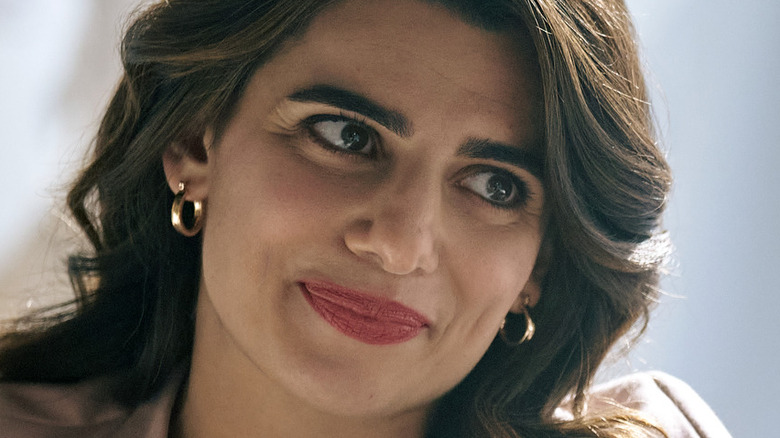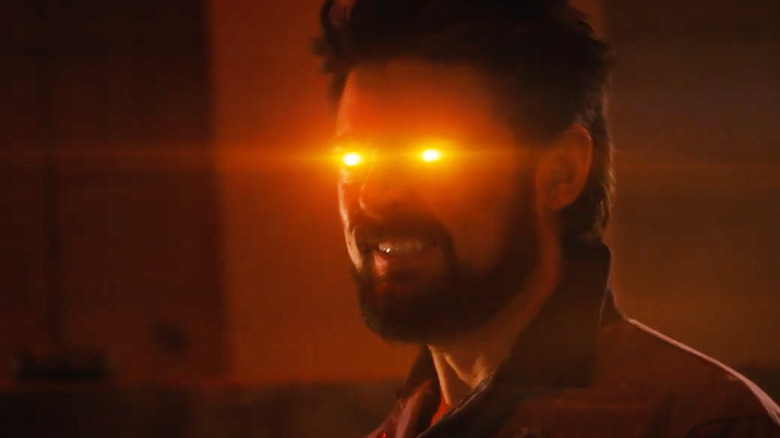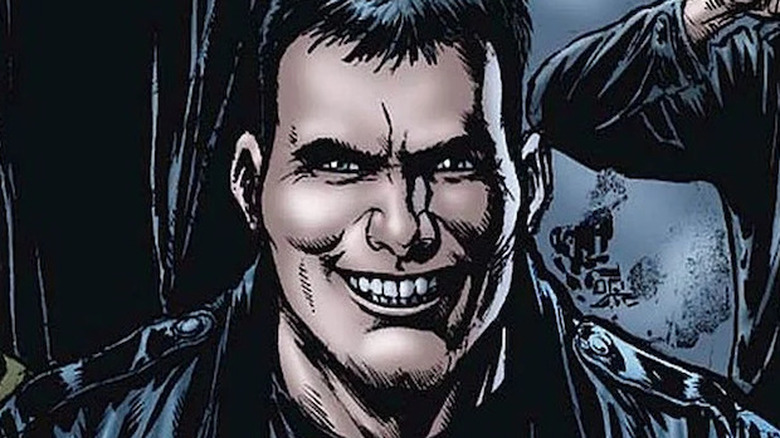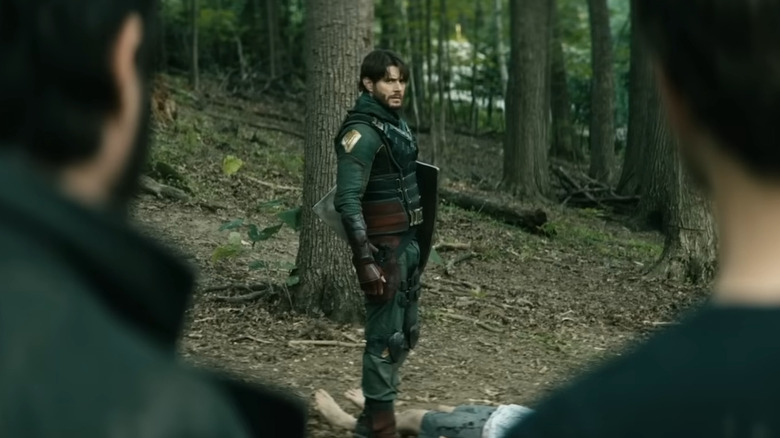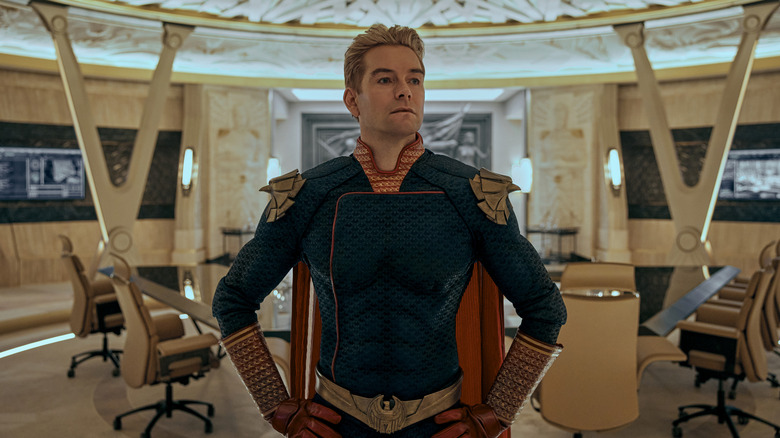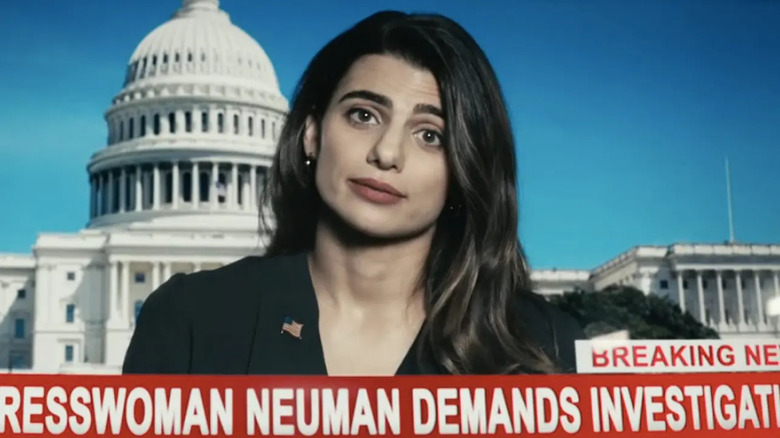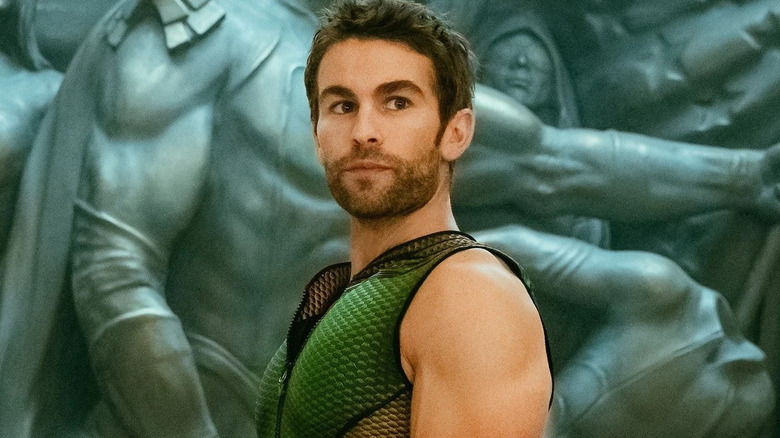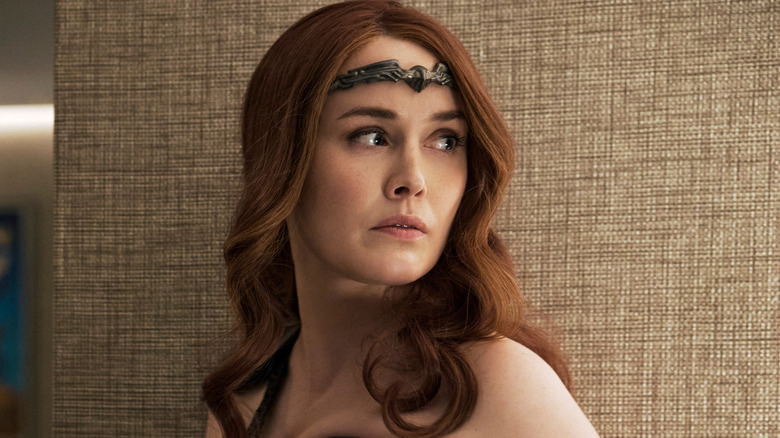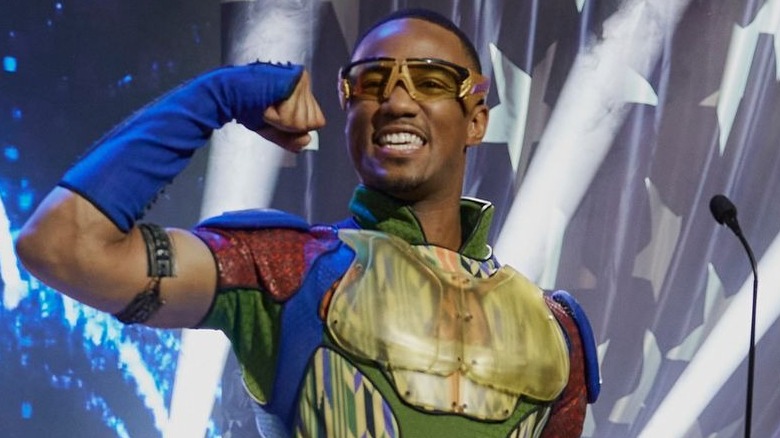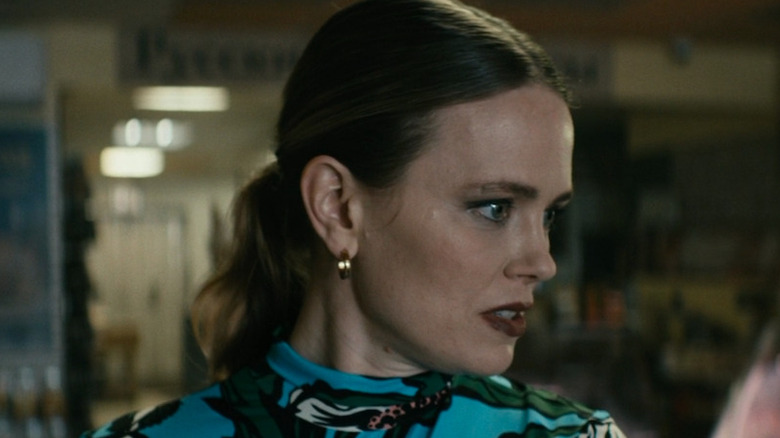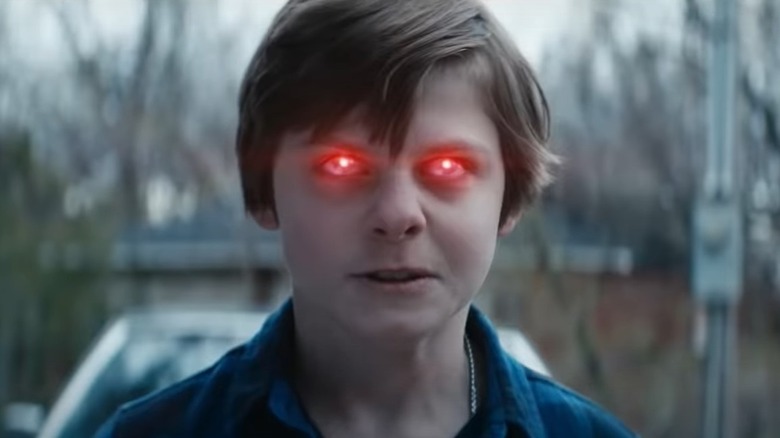Biggest Unanswered Questions In The Boys Season 3
"The Boys," Amazon's violent and bloody superhero satire, is one of the craziest shows currently streaming. Based on the comic series of the same name, it follows Hughie (Jack Quaid), a mild-mannered civilian who joins up with the eponymous anti-superhero group after his girlfriend is murdered by a jerk in tights. The Boys are led by the strong-willed Billy Butcher (Karl Urban) and consist of druggie tech whiz Frenchie (Tomer Capone), military man Marvin T. "Mother's" Milk (Laz Alonso), the enigmatic Female (Karen Fukuhara), and, eventually, idealistic Starlight (Erin Moriarty). Together, they face off against fiendish corporation Vought International and the Seven, a famous superhero team led by the violently jingoistic Homelander (Antony Starr).
The world of "The Boys" is brutal, murky, and complex. Season 3, which might just be the show's most intense slate of episodes, takes things to an even wilder place. Revelations rock the world, major choices are made, and blood is spilled. Though many truths are revealed over the course of this season, it still leaves some lingering mysteries in its wake. These are the biggest unanswered questions in "The Boys" Season 3.
Will Hughie and Butcher have residual powers?
In Season 3, Billy Butcher and Hughie gain superpowers from Compound V. Butcher is granted Homelander-esque super strength and heat vision, while Hughie can teleport. But there's a catch: After 24 hours, the effects of this batch of Compound V wear off. This is different from the Compound V we've seen thus far, which is permanent ... assuming you're not blasted by Soldier Boy's de-powering chest beam, of course.
Vought created this new strand of Compound V at the behest of CEO Stan Edgar (Giancarlo Esposito) in an attempt to persuade presidential candidate Robert Singer (Jim Beaver) to allow super-soldiers in the military. Soldiers empowered by this serum lose their abilities after completing a mission, which is meant to assuage Singer's concerns. However, tests show that multiple doses of this new Compound V, called "V24" or "Temp V," cause life-altering brain damage. This convinces Butcher and Hughie to stop using it by the end of the season. But a powerful question lingers: Could they retain residual powers? It would certainly be interesting to see Butcher and Hughie grapple with stopping supes while technically being supes themselves.
Will Billy Butcher become the bad guy?
Believe it or not, the main threat at the end of "The Boys" comic series isn't Homelander — it's Billy Butcher himself. After Butcher takes revenge on Homelander and the supe who murdered his wife, he feels empty instead of satisfied. Rather than move on, he decides to enact a plan that will kill anyone with Compound V in their system. This would include a vast number of innocent people, as the other members of the Boys realize in "The Boys" #68. They try to stop him, but Butcher ends up murdering them too. In the end, only Hughie is left alive to kill Butcher before he slaughters millions.
The show has already made a lot of adaptational changes, so there's no telling how closely its ending will stick to that of the comics. But certain moments in Season 3 imply Butcher's heel turn is a definite possibility. Consider the moment he brutally murders a defenseless and surrendered Gunpowder (Sean Patrick Flanery). This crosses a major line — one that might just put him in "outright antagonist" territory.
What's the CIA going to do with Soldier Boy?
At the end of Season 3, the Boys and Homelander barely defeat Soldier Boy (Jensen Ackles). CIA contact Mallory (Laila Robins) is glimpsed with his unconscious body in a secret facility. What is the CIA going to do with Soldier Boy? Obviously, the former hero's de-powering energy blasts could be enormously useful — but in what way precisely? Are they going to try to reverse-engineer what the Soviets have been doing for the last few decades? If so, could there be unforeseen side effects?
It seems possible that the CIA might attempt to coerce Soldier Boy into working for them once more. They could also transfer his power to someone else. But if so, couldn't that person become a liability and yet another loose end down the line? There's not really a lot of precedent for this storyline in the comics, which means we're in truly uncharted territory. Any of these questions might be answered in a wide variety of exciting ways.
Will Vought conflict with a rival corporation?
Vought International is an ominous and omnipresent threat in "The Boys" universe. They have production studios, marketing firms, and the Seven, the most powerful heroes in the world. They're also hoping to carve out their own slice of the lucrative military-industrial complex with the creation of V24, a new strand of Compound V.
But Vought isn't actually the only game in town. Other groups of heroes and corporations exist in "The Boys," even though they don't receive the same focus. With Stan Edgar no longer CEO of Vought International and the impulsive and temperamental Homelander in charge, it feels distinctly possible that the company's standing might finally start falling, prompting a rival to swoop in and fill the void. This could lead to all-out war, and also put a wrinkle in Butcher, Hughie, Starlight, and the rest of the Boys' plan for revenge. Will Vought face such a fight in further seasons? We don't know — but the conditions are certainly perfect for such a titanic struggle to take place.
Will Victoria Neuman become president?
Congresswoman Victoria Neuman (Claudia Doumit) is a fascinating character. It's tempting to describe her as evil, but in truth, she's too complicated to be summed up in this way. While she works behind the scenes with Stan Edgar and Vought International to maintain their agenda, she's also perfectly willing to work with Starlight. Oh, and also, she has head-exploding superpowers — but she keeps that detail quiet.
Neuman is currently running for vice president alongside presidential hopeful Robert Singer, whom Edgar is eager to convince to let superheroes join the military. Homelander is similarly interested. However, Singer is hesitant to enact such a policy. An intriguing question arises from this situation: If Singer and Neuman win, will she use her powers to kill Singer and take the presidency for herself? She's working with the bad guys already — why not help their plan along and take the top spot? Whether or not she'll get the opportunity to do so remains to be seen, but Season 3 makes it seem like a very real possibility.
What's the Deep's standing in the Seven?
The Deep (Chace Crawford) is the low man on the totem pole within the Seven. In the comics, the character is a parody of the supposedly useless Aquaman. Despite the fact that Jason Momoa has since made talking to fish into a truly cool superpower, "The Boys" TV series retains this characterization. The Deep fails to save a dolphin in Season 1, and is unable to stop the Boys with a whale in Season 2.
After Queen Maeve betrays Homelander to work with the Boys and A-Train becomes unable to use his powers due to his failing heart, the Deep rises within the Seven's ranks. Unfortunately, his fortunes take a turn for the worse as Homelander becomes more and more unhinged. Perhaps most horrifyingly, Homelander forces the Deep to eat an octopus he considers a dear friend. And that's not even the end of his troubles: The Deep's wife decides to leave him and write a memoir about how awful he is after he tries to initiate a rather unique bedroom situation. With all these issues and events piling up, the Deep's position within the Seven is unclear. Is he down? Is he up? Is the latter prospect even worth it?
Will Homelander find Queen Maeve?
At the end of Season 3, Soldier Boy, Homelander, the Boys, and Queen Maeve (Dominique McElligott) engage in a massive battle. She wants revenge on Homelander more than she wants to stop Soldier Boy, which is, frankly, understandable. As Soldier Boy prepares to shoot his de-powering beam and blow up everyone in the vicinity, Maeve grabs him and jumps out of the building, ensuring his explosion doesn't hurt anyone else. This is in major contrast to an earlier moment, when she expresses disbelief in the entire concept of heroism to Starlight.
While Maeve initially appears to die in the explosion, she is seen happily reunited with her long-time girlfriend Elena (Nicola Correia-Damude) at the end of Season 3. Sure, she's been de-powered and severely injured, but she's alive. However, a question regarding this state of affairs soon emerges. Given Maeve and Homelander's connection, how long will it take him to find out about her survival? How safe is Maeve from Homelander's grasp — to say nothing of his X-ray vision? Now that he knows how deep her connection to his opposition truly is, what will he do if he does manage to find her?
Will A-Train find redemption?
In both the comics and the TV show, A-Train (Jessie T. Usher) is the arrogant supe who kills Hughie's girlfriend with his out-of-control super-speed. The ink-and-paper A-Train feels remorse for this ... then proceeds to get over it at a rapid clip. In contrast, before Hughie fights A-Train in the TV series, A-Train sincerely apologizes to him.
As this moment indicates, the TV show's A-Train is very different from his comic counterpart. His experiences as a Black man have especially impacted him: He contends with the over-policing of Black neighborhoods, faces tokenization from his peers, and struggles with his outsider status among the Seven. In contrast, A-Train of the comics is white, and deals with none of these issues.
Season 3 of "The Boys" takes A-Train even further away from his comic storyline. In fact, it seems to be setting up a redemption arc. Will A-Train find his way back into true heroism? He certainly doesn't in the comics, but it's unclear how much that matters. However, the TV series does love to pull the rug out from under its viewers, which means this possible redemption arc could be a bait-and-switch.
Will Little Nina come back?
Little Nina (Katia Winter) is a cruel Russian mob boss Frenchie used to work for. When the Boys find out Soldier Boy was kidnapped by the Soviets while fighting rebels in Nicaragua and subsequently experimented on, Butcher forces Frenchie to get back in contact with Nina for the sake of her connections. Though Frenchie protests, it's to no avail.
Eventually, this comes back to bite the Boys. Nina gets angry that their pursuit of Soldier Boy leads to them killing a lot of her aforementioned contacts. The end of Season 3 sees her pull off a violent and harrowing escape. Little Nina is still at large, which prompts no end of questions. Will she become a problem for the Boys down the line? What about Vought? In the comics, she becomes a major threat: "The Boys" #13 even indicates she wants to take over all of Russia. Will that be a plot point on the show as well?
Will Ryan become evil?
Ryan, son of Homelander and Billy Butcher's wife, Becca (Shantel VanSanten), is fairly innocent. After his birth, he's raised by Becca in a secret facility, where she teaches him right from wrong and tries to keep him from using his inherited powers. Unfortunately, Homelander wants to become a bigger part of Ryan's life, and attempts to force him to use his abilities. Ryan initially resents Homelander, especially since his training methods border on abuse. But when Stormfront (Aya Cash) attacks, Ryan engages his out-of-control laser vision, accidentally killing Becca. With her dying breath, Becca asks Butcher to promise to look after Ryan and not blame him for her death.
At the beginning of Season 3, Ryan is being raised in secret. Billy tries to make time to video chat and visit when he can, to fulfill his promise to Becca. But eventually, Ryan is taken in by Homelander. To make matters worse, after Homelander kills a protester and is promptly celebrated for it, Ryan gives an eerie smile. Does this smile foreshadow a villainous turn? Ryan's storyline is a major difference between "The Boys" comic and TV show – in the former, he essentially doesn't exist. This means there's no telling where his arc might go. He could pull himself away from the dark side ... or he could give into it entirely.
